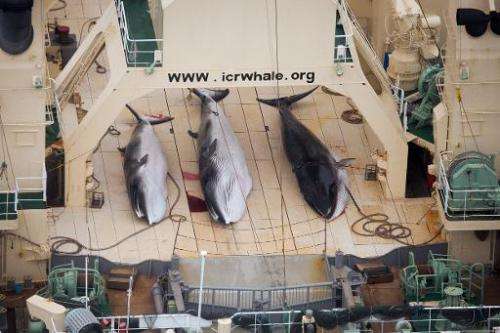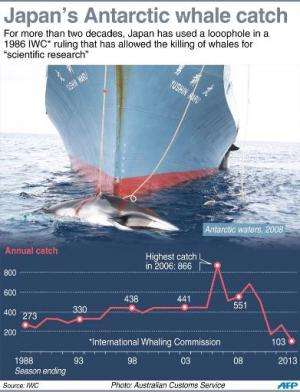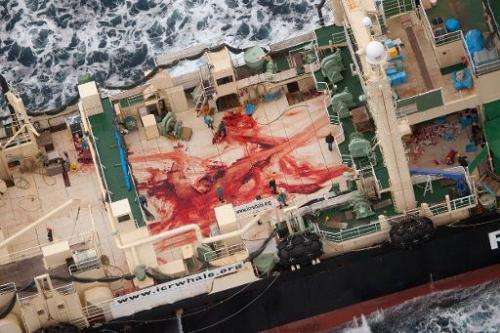Japan cancels next Antarctic whaling hunt after ICJ ruling

Japan said Thursday it was cancelling its annual Antarctic whaling hunt for the first time in more than a quarter of a century in line with a UN court ruling that the programme was a commercial activity disguised as science.
A "deeply disappointed" Tokyo earlier this week said it would honour Monday's judgement by the United Nations' Hague-based International Court of Justice but did not exclude the possibility of future whaling programmes.
On Thursday, officials said the next Antarctic hunt, which would have started in late 2014, had been scrapped, just weeks after the most recent one finished.
"We have decided to cancel research whaling (in the Antarctic) for the fiscal year starting in April because of the recent ruling," a fisheries agency official told AFP.
But he added that "we plan to go ahead with research whaling in other areas as scheduled", including the northern Pacific. Japan also has a coastal whaling programme that is not covered by a commercial whaling ban.
Australia, backed by New Zealand, hauled Japan before the ICJ in 2010 in a bid to end the annual Southern Ocean hunt.
Tokyo has used a legal loophole in the 1986 ban on commercial whaling that allowed it to continue slaughtering the mammals, ostensibly so it could gather scientific data.
However, it has never made a secret of the fact that the whale meat from these hunts can end up on dining tables.
Public consumption of whale meat in Japan has steadily and significantly fallen in recent years and there is little support for whaling itself

But aggressive anti-whaling campaigns hardened sentiment among the Japanese public, who came to see the issue as an attack on differing cultural values.
"I think everyone knew all along that research was a fig leaf to disguise commercial whaling," said Jeffrey Kingston, an Asian studies professor at Temple University in Tokyo.
"But the Japanese government erred in thinking that this loophole...provided a legal basis for continued whaling as long as it asserted that it was for research. It did not anticipate that the research argument would be exposed as a sham."
Diplomatic pressure
Japan had argued that its JARPA II research programme was aimed at studying the viability of whale hunting, but the ICJ found it had failed to examine ways of doing the research without killing whales, or at least while killing fewer of them.
"Whale meat is an important source of food, and the government's position to use it based on scientific facts has not changed," Agriculture, Forestry and Fisheries Minister Yoshimasa Hayashi told a press conference Tuesday in response to the judgement.
On Wednesday, Japanese Prime Minister Shinzo Abe said his government would abide by the court ruling, but added that the ruling was "a pity and I am deeply disappointed".
Some legal experts have suggested Japan might simply redesign its whaling programme to skirt the ICJ ruling, but Australia and New Zealand are expected to keep up the diplomatic pressure to ensure Tokyo abides by the spirit of the pronouncement.

However, Shohei Yonemoto, visiting professor on global environment and bioethics at the University of Tokyo, said the ruling would provide Tokyo with a convenient way of getting out of a money-losing and controversial business.
"Japan should not miss this opportunity to use the ruling as an excuse to fully review its whaling programme without losing its face," he told AFP.
Hisayoshi Mitsuda, professor of environmental sociology at Bukkyo University in Kyoto, added: "Financially, whaling doesn't pay—it's a decaying industry."
Three countries —Japan, Norway and Iceland—use objections or exceptions to continue whaling, a practice observers say claims more than 1,000 of the marine mammals, some endangered, each year.
But Japan is the only country to conduct whaling under a scientific permits category.
There are two major whale sanctuaries. One, which covers most of the Indian Ocean, was created in 1979 and is a breeding ground for many types of southern hemisphere cetaceans.
The Southern Ocean Whale Sanctuary, surrounding the continent of Antarctica, was set up in 1994. Its waters, teeming with marine life, serve as a feeding ground for more than a dozen whales species.
© 2014 AFP





















